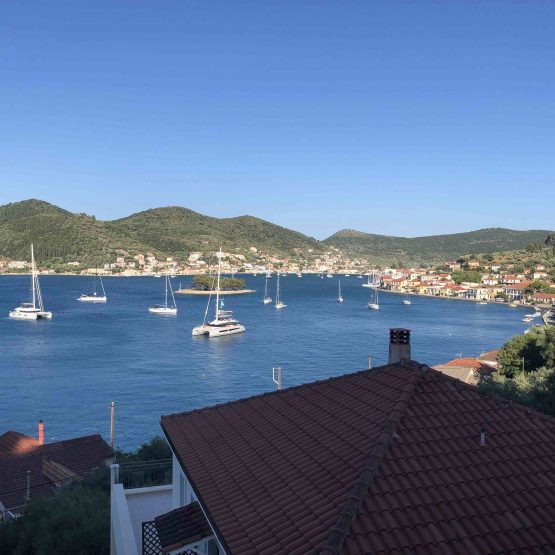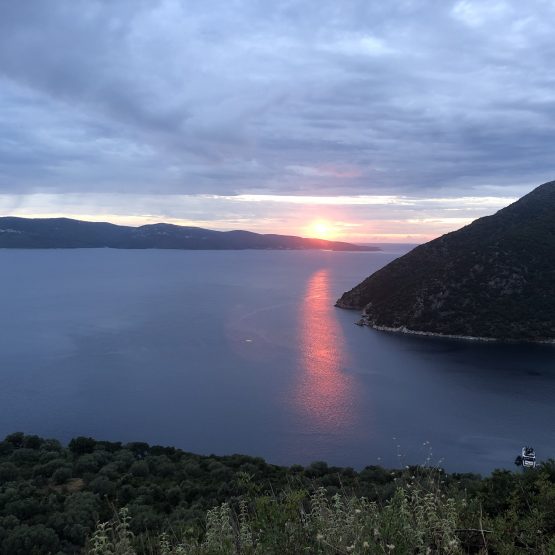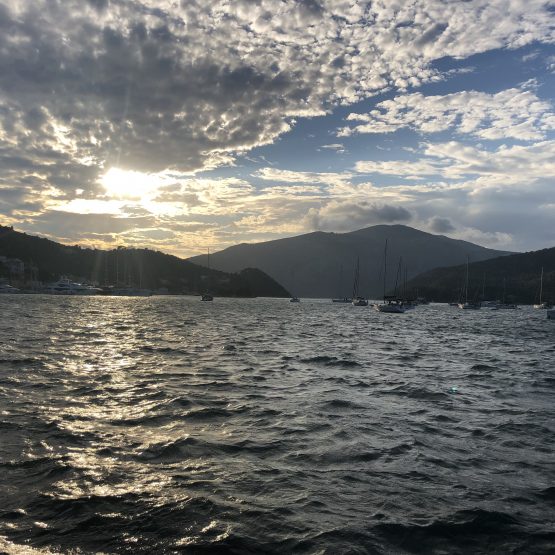Walking in fields
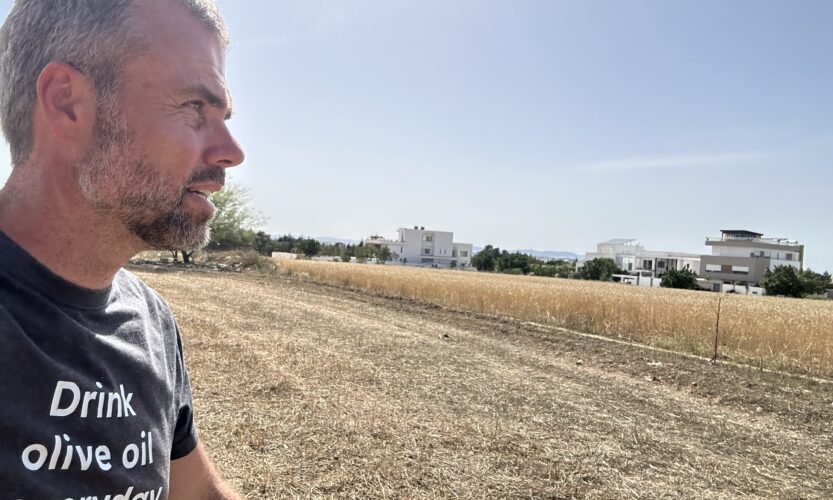
I was born in London, Canada, and raised in St. Thomas. Southwestern Ontario is agriculturally generous—Endless acres of cropland. As a child, when my parents used to drive from St. Thomas to London, I used to look out the window at the long fields that stretched over crests or into the horizon. I used to think–words that I can only summarize at my age now–how simple and joyous life would be to just walk in fields. Now I walk in fields all through the Mediterranean. And how simple and joyous life is.
The feature image is from El Marsa, Tunisia, in 2024.
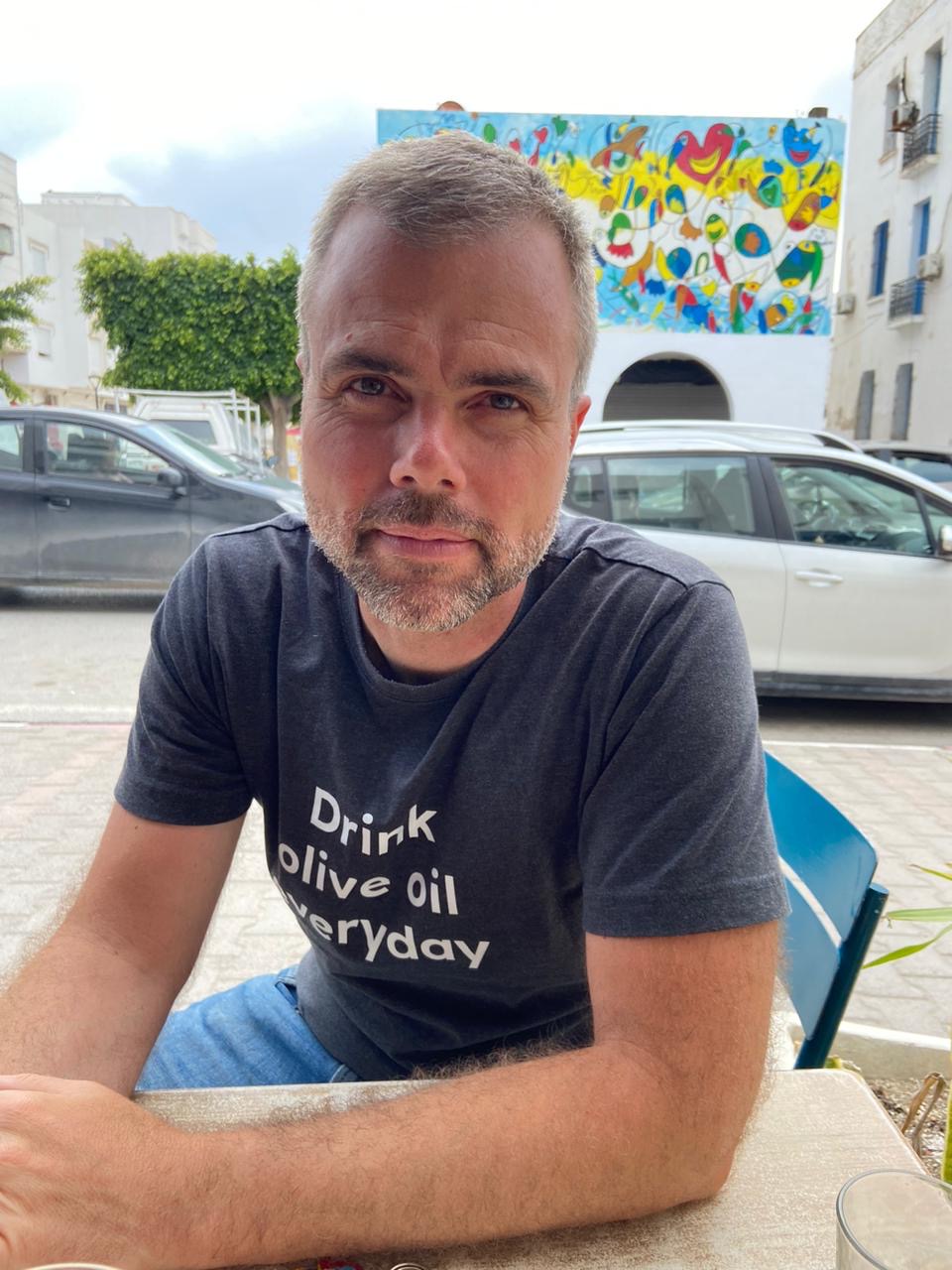
Andrew Schiestel explores and documents the Mediterranean Basin. He was born in Canada.
The Empty Patio
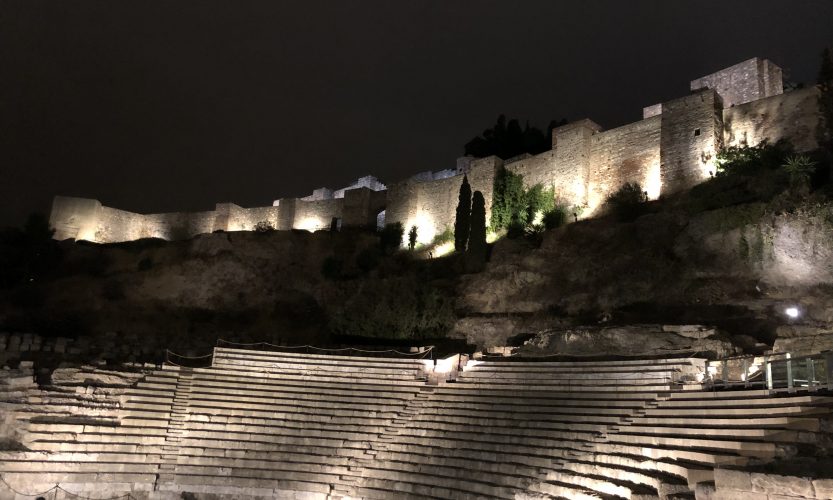
Tom walked around a cobblestoned corner in Centro en Málaga, not far the Museo Picasso Málaga, and halted at the patio of a café, six tables, all empty. The Centro was rambunctious in much whereabouts, but this evening, this café was not—disadvantaged with a dead-end, making the street more of an alleyway than a street. Tom sat down, ordered a Cherveza Victoria that was accompanied with a glass that was more of a shot glass than a beer glass if it wasn’t for its girth, sipped the beer and smoked a Montecristo. Tom’s arrival was most fortunate for the restaurant operator and the operator knew it. Soon four tables were full, alive with chatter. Like many businesses—especially one in a Centro—a customer leads to another. The café operator returned the favour by telling Tom, in Spanish, where the best paella in all of Málaga lay.
The hero image is of the Alcazaba in Málaga, a fortification built in the 11th century by the Hammudid dynasty, a former Islamic empire that ruled several parts of southern Spain.
The Empty Patio is available for purchase as artwork at Ithacabound.com.

Andrew Schiestel explores and documents the Mediterranean Basin. He was born in Canada.
Paseo del Parque
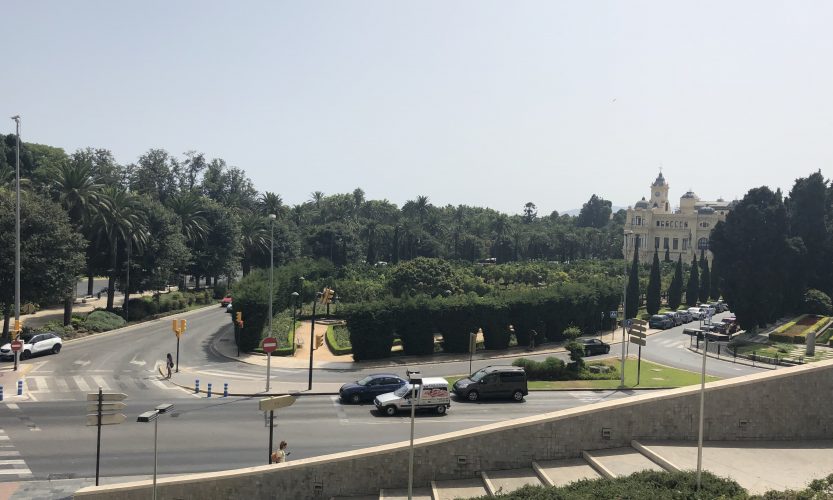
Father and mother in front, young daughter and son in rear; the family, Galician-descent, walk enthusiastically along the Paseo del Parque in Málaga. The girl, shorter and smaller than her older brother turns to him, takes her right-hand, palm-open, and slaps his right-forearm, five-fingers and all, so riveting any passerby could hear. The boy yelps with all he could muster, looks to the parents who don’t turn around—enjoying their conversation too much—takes his left hand and performs an in-kind gesture. The sister yelps, looks to the parents who don’t look back, enjoying their conversation some more. The four would enjoy themselves very much that day in the Centro. The boy and girl grew up playing much football: the girl a professional, the boy almost so. The girl always took much initiative.
The hero image is of the east-entrance of the Paseo del Parque in Málaga, Spain. The Paseo del Parque is uniquely positioned in the middle of several attractions: southeast of the Centro, north of the sea, northwest of the La Malagueta (a bullfighting stadium) and southwest of the Alcazaba. The photo was taken on the steps leading up to the Alcazaba.
Paseo del Parque is available for purchase as artwork at Ithacabound.com.

Andrew Schiestel explores and documents the Mediterranean Basin. He was born in Canada.
Gods of Ithaca
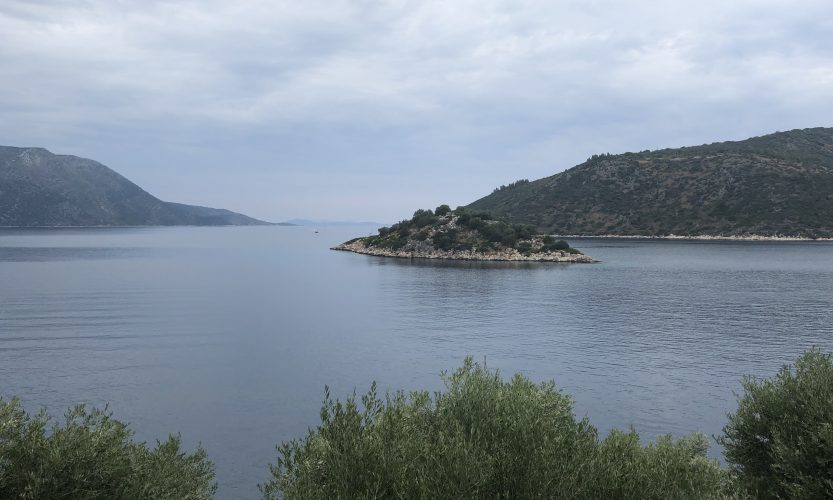
It rained today in Lefki, said Tom to the Ithacan-born, South African in a British school-raised, Fort Lauderdale resident, who spent the last thirty summers in Vathi. The grey-bearded Ithacan perked one side of his lip wryly and wittingly responded, We have a different God in the south.
The hero image is of the Isle of Σκαρτσουμπονήσι. Legend has it that Poseidon when learning that Odysseus first returned to this cove in eastern Ithaca casted a menacing spell that transformed his ship into this stone-bed islet.

Andrew Schiestel explores and documents the Mediterranean Basin. He was born in Canada.
Café In An Alley
He sat in the stone-laid alleyway directly west of Vathi’s square on the café-patio, the occasional local stopping or walking by. He tasted the second piece of cake, petite in size, that accompanied his last coffee that was now complete. He preferred biscuits but it was cake that was served. Tom stood up and walked fifteen meters west to the counter at the entrance of the café that was lit only by natural light. The server turned to him as did two customers—one seated, the other standing—inside, both becoming silent. The server smiled at Tom. “Another.” The server’s smile turned mischievous. “Allo! Another!” The server maintained his mischievous smile. “Eísai kalá? Are you okay?” Tom volleyed his own smile, in-kind, “Aye!” He turned and walked slowly back to the table that had full plates of cake if it weren’t for the two bites and would soon finish his third cup of Greek coffee.

Andrew Schiestel explores and documents the Mediterranean Basin. He was born in Canada.
Gýrna xaná sti douleiá
The front of the café sat the heavier set man, sunken shoulders, unshaven face, almost a near-completed balding scalp, and opaquely tinted sunglass that were worn four centimeters from the tip of his nose. The hostess was friendly and would talk to Tom. She was a Greek who went to a university in Albania. Gýrna xaná sti douleiá! The owner would yell at her when she talked too much with Tom. The owner tolerated a little bit of talk, not too much, but a little bit that first night because Tom ordered a crêpe. The man lacked the breadth of crêpe ingredients of a grandiose crêpe café, didn’t know what Oreos were, but loved to make crêpes for the tourists. His face lit up when two more orders came in following Tom’s. Grinning cheek-to-cheek in front of the two blackly painted crêpe makers, he exclaimed to Tom, Two more! The next day the girl smiled at Tom as he walked by, Tom paused, and they conversed again. It was University of New York that had a campus in Albania. And she found the United States, Very nice. And the same with London, U.K. Gýrna xaná sti douleiá! The store owner yelled again, having smiled at Tom only moments before when he walked outside. Tom wasn’t in the mood for another crêpe. Good bye, she said to Tom forcing a smile, Good bye.

Andrew Schiestel explores and documents the Mediterranean Basin. He was born in Canada.
Over the Hillside
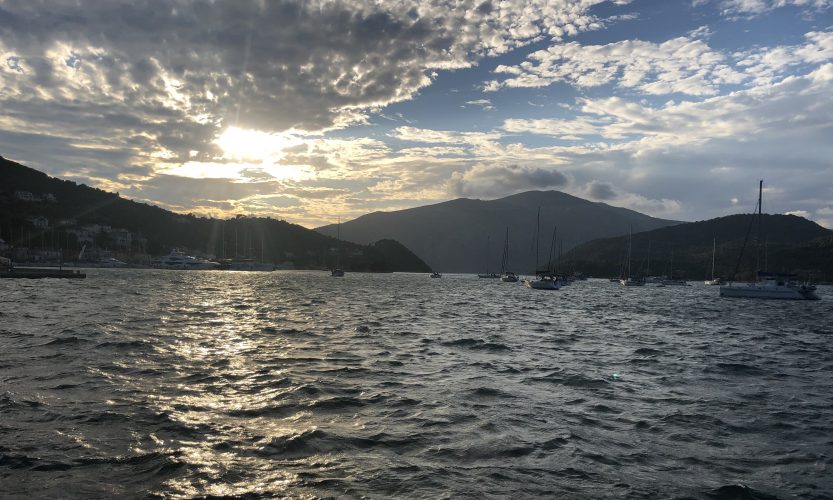
From Holland, I am, She said to the traveller. Why this island? he countered. Because of love. Ahh, yes, it’s a special island, He conversed. Yes, and a man, She said. Ahh, you fell in love. Aye, She responded. You’re from Holland, living in Ithaca, and met a Greek man? Aye, I did. Love and warmth written all across her face. Me and a girlfriend travelled here four years ago. She was snorkelling and I was bored on the beach. The Dutch-woman raised her right hand and pointed over the hillside, east of Vathy. I was trying to read a book, and that’s when he walked up to me. I’ve traveled the world, then ended up falling in love, here. It was sort of funny, and difficult, telling my family I was going to extend my vacation. It happens when you least expect it, She continued, blushing at the recital of it all.
The featured image is of the sun setting on Vathy’s bay on the Island of Ithaca; sailboats anchored for nightfall.

Andrew Schiestel explores and documents the Mediterranean Basin. He was born in Canada.
Boys and Their Toys
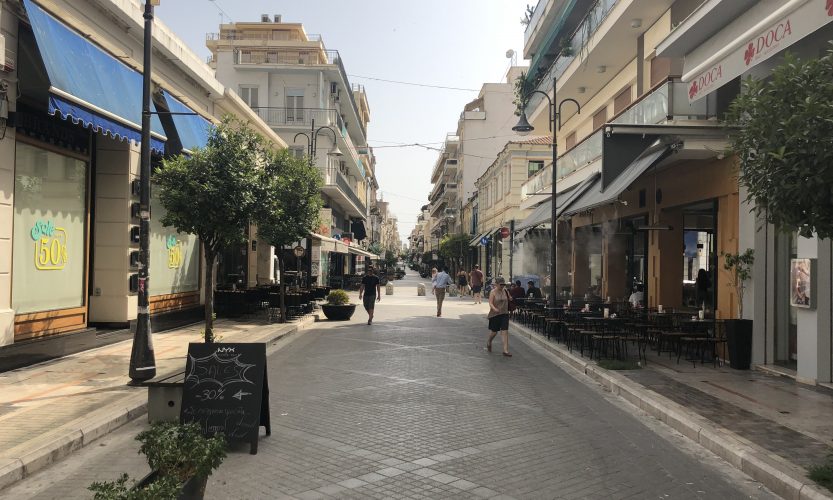
The young boys, maybe seven and eight, were high-strung after eating souvlaki. It was time to travel down the streets of Patras some more. The two families crossed the street. The older boys, maybe twelve and thirteen, were to go with the one mother, the younger boys with the other. The one young boy stood frozen, his back to the street, peering into the window of a retail store. The other young boy walked over to him, stood to the left of him, peered through the window too and put his right arm around the other boy’s right shoulder. The two—short, almost identical in height—would peer together at the toys in the shop’s window. The mothers kept talking but were getting ready to go separately. Over lunch, they spoke Italian; now they spoke English. Come boys, the one Mom said to the young boys. Come. The boy loosened his grip on the shoulder of the other and walked steadily to a narrow shelf outside that contained childrens’ books and put his hand upon some and held it still. The other boy, who originally took the initiative entered the toy store by four steps. Come on you two, the mother said. The boy loosened his grip on the books and came closer to his Mom and stood still; the initiating boy turned 45 degrees and stood staring up at the woman in silence. Come on you two. She would say again, intensifying but not yelling nor being menacing. The boy would continue to stand in the foyer of the shop. Come, come on. The boy would finally leave the shop and waddle behind the two of them, ever slowly, not looking down, nor looking up. The Mom and older two boys parted south cheerfully, the Mom with the young boys began crossing the street. Hands, boys, hands. The one boy would clasp her right hand, she would leave her left outward jarred behind her for a few moments as she walked, the two walking for the corner on the northeast edge of the street’s block. They would walk north then east in a dog-leg pattern around the sidewalk, the initiating boy would walk behind them, never taking her hand. She never asked again that day. Both young boys would walk crestfallen.
The hero image above is of the entertainment district of Patras, Greece. Patras is a port city, medium in size in western Greece, situated at the eastern tip of the Gulf of Patras which runs into the Ionian Sea.

Andrew Schiestel explores and documents the Mediterranean Basin. He was born in Canada.
Premonitions
He once told his dear friend, an Indian woman that one day he would end up marrying her or a Turkish woman he was seeing. The Turkish woman married someone else and the Indian woman and him would end up seeing each other briefly a decade later, but they never did kiss. He found her unreliable and he told her so. In that hiatus, he would fall madly in love with a Caucasian woman that he absolutely adored in company, sex and kisses. To and fro, they would end the relationship with each other, like a game of volley. She would return with a final offer in which he rejected. Over time, he would go on to believe he would marry an Indian or Spanish woman. He met a Spanish woman that reminded him of his Indian friend in every way shape and form, except culture. In that bar in Milano, he didn’t get her phone number but instead gave her his email address because he hadn’t charged his phone with the change in electrical outlet systems travelling from Switzerland to Italy that day. He never did hear from the Spanish woman.

Andrew Schiestel explores and documents the Mediterranean Basin. He was born in Canada.
